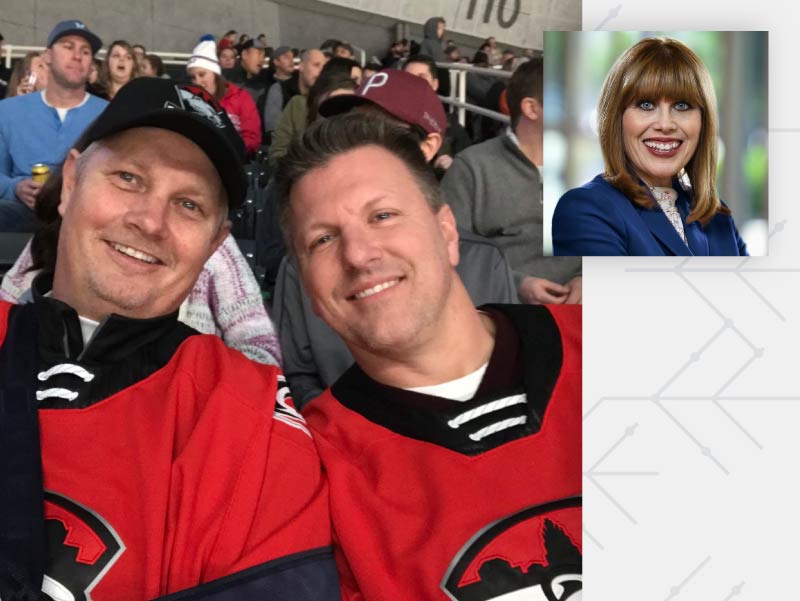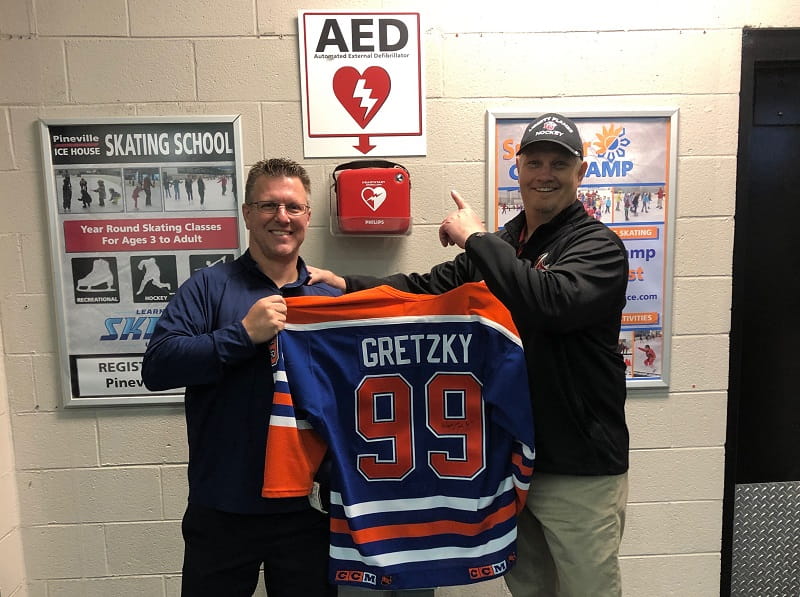When hockey player's heart stopped on the ice, CPR and an AED saved him
By Nancy Brown, American Heart Association CEO

If Jib Street's heart had to stop, the perfect moment was on Jan. 18 while he was playing hockey at the Pineville Ice House in Pineville, North Carolina.
An emergency room doctor also was playing.
The rink had an AED.
An ambulance was blocks away.
A hospital was about 2 miles away.
Jib was wearing a helmet and pads, protecting him when he collapsed.
The chill of the ice preserved his organs during the six minutes they were starved of oxygen.
And atop all those crucial elements was a quirky one: A surveillance camera captured it all.
The video of Jib's heart stopping and restarting landed him on Fox News, the "Today" show, "Inside Edition," national TV and radio across his native Canada, and countless more outlets. He and his lifesaver were honored at an NHL game. Jib has even toured the factory where the AED that saved him was made.
Inspired by responses to his story, Jib is working to put it to even better use.
He's launching a campaign across multiple levels of hockey and other sports in the U.S. and Canada that will be aimed at educating people about CPR and AEDs. It's a perfect message to share this first week of June, as it is CPR and AED Awareness Week. And Jib is the perfect pitchman.
***
Jib grew up in Vancouver. An adept skier, he competed professionally and with Canada's national team in moguls as a teen and young adult. He also excelled in basketball, rugby, cross country and track.
But like most Canadian kids, his passion was hockey.
Over the years, Jib played with and against many future NHL players. He also coached many youngsters who went on to play college and pro hockey, several reaching the NHL. He also coached multiple championship teams, including one at the top level of youth hockey in Canada.
In the early 2000s, Jib moved to Aspen, Colorado, to run sales and marketing for a company that developed ski resorts. He eventually left to run his own real estate company.
After a difficult divorce, Jib settled on a lake outside Charlotte. He stocked his office with hockey memorabilia, including mannequins wearing jerseys signed by Hall of Famers Bobby Hull, Brett Hull, Bobby Orr, Mario Lemieux and Wayne Gretzky. The Gretzky jersey was his most prized possession.
Jib also was a regular at Friday afternoon pickup games at the Pineville Ice House. Everyone in town knew that was the time and place for the most experienced players.
As of Jan. 18, Jib hadn't played since around Thanksgiving. He was eager to get back in action, partly to knock off the rust before an upcoming game with his son. Another reason: On New Year's Day, he'd quit drinking, started eating healthier and began going to the gym.
So as Jib drove to the Ice House, he was eager to see how his improved fitness would pay off.
***
About 12 minutes into the first game, Jib skated by the opposing goalie to head toward the other end of the ice. Jib wobbled a bit after changing directions, took two strides and veered right.
He kept veering until landing hard on his right shoulder. An opponent glided over to check on him.
Another opponent, Dr. Craig Bryant, skated in with more urgency.
He determined that Jib had no pulse, wasn't breathing and wasn't responsive.
"Dial 911!" Craig screamed.
He knew it was time to start CPR – something he was accustomed to doing on the job but had never done outside a hospital. He also told players to fetch the rink's AED.
When the AED arrived, the machine advised that Jib needed a shock to try restoring his heart's rhythm. About the same time, the ambulance arrived.
By 12:20, Jib was breathing again.
By 12:22, Jib was on a gurney, headed to an ambulance. Players who thought they'd just seen someone die were now in awe of what else they saw. They responded by tapping their sticks on the ice, hockey's traditional salute offering respect and appreciation.
***
At the hospital, doctors discovered that an artery in Jib's heart was completely clogged – and had been for a while.
He'd previously suffered a heart attack. That or a hereditary heart problem likely triggered his cardiac arrest on the ice. (While often considered interchangeable, they're not. Think of a heart attack as a plumbing problem and cardiac arrest as a power outage.)
Doctors determined that Jib needed open-heart surgery. But not immediately. Four days later, doctors implanted a device that monitors his heart's rhythm and can shock him back to life should the power go out again. It's formally known as an implantable cardioverter defibrillator. His has been dubbed The DeJibrillator.
***
Jib was recovering from that procedure when he received an email from a woman at the rink. She wanted permission to share the surveillance video.
He didn't know it existed.
Firing it up on his phone, Jib watched his life nearly end if not for relentless CPR and the AED. Tears flowed as he struggled to process what he'd seen.
He got home the next day and watched again. He was hesitant about giving his OK. Then he realized the power of that moment was exactly why it needed to be shared.
***

Watching the video triggered another feeling: He had to meet the guy who saved him.
They'd spoken in the ambulance and in the ER, but Jib was too out of it to remember the name or the face. All he knew was that he worked at this hospital. In the cardiac ICU, Jib kept asking whether anyone knew which doctor played hockey; nobody did.
A closer look at the email revealed that it had been sent to two people. The other recipient: Dr. Craig Bryant.
Their first proper meeting came at the Ice House. Fox 46 Charlotte captured the visit, including Jib expressing his appreciation in a way understood by anyone who loves hockey: He gave Craig his signed Gretzky jersey.
The story quickly spread across Canada, prompting a call to Jib from the CEO of the Edmonton Oilers, the team where Gretzky enjoyed his greatest success. The Oilers were playing in Raleigh that night and wanted Jib to be their guest. (At the game, they told him Gretzky was signing another jersey for him.)
When Jib arrived, a PR person for the Carolina Hurricanes also was thrilled to meet him. The club had been trying to track him down in hopes of honoring him and Craig at a game. Jib noted that Craig's favorite team is the New York Rangers, so it was set for their next visit to Raleigh.
The Hurricanes-Rangers game proved to be the start of a great friendship. Jib and Craig have hung out several times and spent more time together during interviews. Such as the one where Jib met the other hero in this story.
***
As Jib was going under anesthesia for the insertion of his ICD, he noticed someone wearing a Pittsburgh Penguins-themed surgical cap.
A few seconds of hockey talk followed, including the guy humbly mentioning he was the one who convinced the owner of the rink to put in the AED.
"You're like my second guardian angel," Jib said as he drifted off without catching the guy's name.
A few weeks ago, Jib and Craig were back at the rink filming another video. Cameras captured Jib watching Craig play and greeting him as he came off the ice with another player. The stranger removed his helmet, revealing a Penguins surgical cap.
Jib smiled and gave electrophysiology specialist Tim Pasterchalk a big hug.
Soon after, the three gathered at the AED. Alongside the man who had used it and the man who was responsible for it being there, Jib held the device that saved his life.
It was his first time touching an AED. He gave it a grateful kiss.
***
Jib is still recovering from all he's been through. And he still has open-heart surgery looming.
Yet his joy is infectious. Every day is a gift, he said.
He thinks about his father dying of cardiac arrest at 49, and his dad's dad being in his early 50s when he died of a heart problem. Jib will be 55 this summer, all because he's alive in an era of advanced medical technology. Contrast his story to what happened to his elders: His dad got CPR but an AED wasn't available; his grandfather didn't have either.
Jib believes he can inspire more people to become potential lifesavers by learning CPR and learning how to locate an AED, how simple they are to use and how effective they are.
He's stunned that AEDs aren't as common as fire extinguishers, carbon monoxide detectors and other lifesaving tools.
And as someone whose last CPR training was decades ago (well, until recently going to classes), Jib was thrilled to learn how easy it is to do Hands-Only CPR: push hard and fast in the center of the chest, preferably to the beat of the disco classic "Stayin' Alive."
He also knows that about 90% of people who suffer out-of-hospital cardiac arrests die. But CPR, especially if performed immediately, can double or triple a cardiac arrest victim's chance of survival. The odds go up if an AED is available. He's proof that the chain of survival works.
Realizing how many people already have learned his story, and thinking about how many more can be helped by it, Jib laughed and said, "Not bad for being dead."
"I hope to make the most out of my second chance," Jib said. "Had Craig and Tim not done what they'd done, I wouldn't be here. The best way I can pay it forward to my two guardian angels is by getting more people trained in CPR and having timely access to AEDs."
If you have questions or comments about this story, please email [email protected].
A version of this column also appeared on Thrive Global.





